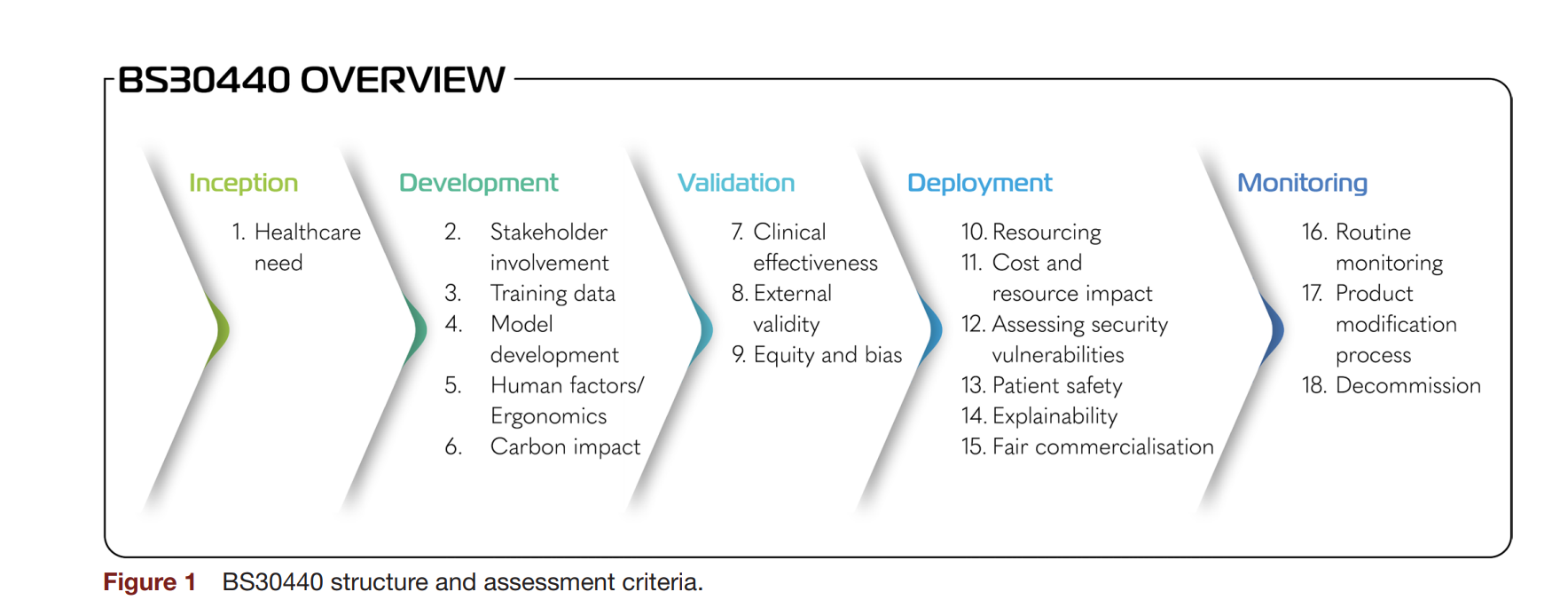health strategy institute (hsi)
management and technology review
research and strategy institute
for in-person health, digital health
and hybrid health strategy
Joaquim Cardoso MSc.
Senior Research and Strategy Officer (CRSO),
Chief Editor and Senior Advisor
January 19, 2023
One Page Summary:
This is a One Page Summary of the paper “Validation framework for the use of AI in healthcare: overview of the new British standard BS30440”m p ublished by “BMJ Informatics”, authored by “Mark Sujan1,2, Cassius Smith-Frazer3, Christina Malamateniou4, Joseph Connor5, Allison Gardner6, Harriet Unsworth7 and Haider Husain3”
The British standard ‘BS30440: Validation Framework for the Use of AI in Healthcare’ is set to be published in the second quarter of 2023.
This standard addresses the increasing interest and use of artificial intelligence (AI) in healthcare, particularly applications utilizing machine learning approaches such as deep neural networks. Over the past decade, the field of healthcare AI has grown significantly, with various guidance documents from government bodies, regulatory authorities, think tanks, and academic institutions aiming to address local contexts.
However, the plethora of guidance has resulted in fragmentation and a lack of formalized standards for healthcare AI technologies not regulated as medical devices.
To bridge this gap, BS30440 was developed as a comprehensive framework, synthesizing the fragmented landscape into a single resource.
The standard underwent extensive review and consultation, involving multidisciplinary experts, public feedback, and patient engagement.
BS30440 introduces a fully auditable assessment process, …
… essential to ensure healthcare AI products offer demonstrable clinical benefits, reach adequate levels of performance, safely integrate into healthcare environments, and deliver equitable outcomes for all users. The framework’s assessment criteria are organized along the product life-cycle, encompassing inception, development, validation, deployment, and monitoring phases.
Notably, it also includes carbon impact criteria, reflecting concerns about the environmental impact of AI expansion in the healthcare sector.
The standard primarily targets developers and deploying healthcare organizations.
By certifying AI products against BS30440, healthcare providers can assure clinicians, staff, patients, and their families of the product’s safety, quality, and performance. Developers are encouraged to conduct self-assessments against the criteria and involve stakeholders throughout the development process.

BS30440 is structured around a product life-cycle for healthcare AI, described in five phases: inception, development, validation, deployment and monitoring.
For each phase of the product life-cycle, a set of assessment criteria has been defined.
The life-cycle within the framework is not intended to be prescriptive or to be thought of in a necessarily linear fashion.
However, all the assessment criteria should be addressed during the product life-cycle.
BS30440 is unique in its focus on AI products, including those not covered by current medical device regulations, ensuring a minimum standard across diverse assessment criteria.
While it aligns with other healthcare IT regulations to some extent, it provides specific guidance for healthcare AI technologies. However, challenges may arise in scenarios where suppliers utilize generic AI products without access to design information.
The publication and use of BS30440 can serve as a testing ground for future international standardization activities in healthcare AI.
Overall, the standard offers a robust, auditable validation framework, promoting ethical AI practices and providing reassurance to developers, healthcare providers, and patients alike.
DEEP DIVE

Validation framework for the use of AI in healthcare: overview of the new British standard BS30440
Informatics BMJ
Mark Sujan1,2, Cassius Smith-Frazer3, Christina Malamateniou4, Joseph Connor5, Allison Gardner6, Harriet Unsworth7 and Haider Husain3
July, 2023
Originally published at https://informatics.bmj.com on June 1, 2023.












